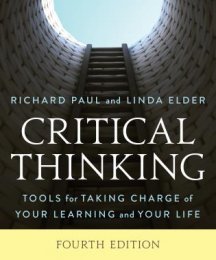Additional Information About:
Critical Thinking: Tools for Taking Charge of Your Learning & Your Life - 4th Edition
Critical Thinking: Tools for Taking Charge of Your Learning and Your Life provides a holistic theme, approaching critical thinking as a process for taking charge of and responsibility for one’’s thinking. Designed to foster the development of critical thinking skills and abilities, fairmindedness, intellectual humility, and intellectual integrity, the approach is an eminently practical one. Numerous meaningful, yet common examples coupled with related activities allow the reader to examine and chronicle his/her own understanding and growth, providing the foundation for the lifelong application of critical thinking skills.
Written by two of the most prominent leaders in the International Critical Thinking movement, Richard Paul and Linda Elder, this is the textbook that will give students the tools they need to achieve deep and significant learning in all disciplines and subjects, as well as in life.
Widely sought as professional development leaders, Paul and Elder have conducted hundreds of workshops for university faculty all over the world. Their work speaks to the universal need to develop a sharp, open, and analytical mind. Tools that enable us to take charge of our learning and our lives are the very same tools that can help us all do more than merely survive in an economically and socially deprived environment.With them we can work independently or with others to produce positive changes.
Critical Thinking: Tools for Taking Charge of Your Learning and Your Life provides a holistic theme, approaching critical thinking as a process for taking charge of and responsibility for one’s thinking. Designed to foster the development of critical thinking skills and abilities, fairmindedness, intellectual humility, and intellectual integrity, the approach is an eminently practical one. Numerous meaningful, yet common examples coupled with related activities allow the reader to examine and chronicle his/her own understanding and growth, providing the foundation for the lifelong application of critical thinking skills.
Originally written as a textbook for college-level students, it is also useful for anyone interested in developing as a thinker.
A companion Web site (www.pearsonhighered.com) provides students with valuable resources to enhance their pursuit to be critical thinkers.
Table of Contents
- Preface
- Introduction
- Chapter 1. Become A Fairminded Thinker
- Chapter 2. The First Four Stages of Development: At What Level of Thinking Would You Place Yourself?
- Chapter 3. Self-Understanding in a Complex World
- Chapter 4. The Parts of Thinking
- Chapter 5. Standards for Thinking
- Chapter 6. Ask Questions That Lead to Good Thinking
- Chapter 7. Master the Thinking, Master the Content
- Chapter 8. Discover How the Best Thinkers Learn
- Chapter 9. Redefine Grades as Levels of Thinking and Learning
- Chapter 10. Make Decisions and Solve Problems
- Chapter 11. Argumentation Theory and Critical Thinking
- Chapter 12. Deal with Your Irrational Mind
- Chapter 13. Develop as an Ethical Reasoner
- Chapter 14. How to Detect Media Bias and Political Propaganda
- Chapter 15. Fallacies: The Art of Mental Trickery and Manipulation
- Chapter 16. Learning & Using Information Critically & Ethically, Part One
- Chapter 17. Learning & Using Information Critically & Ethically, Part Two
- Chapter 18. Strategic Thinking: Part One
- Chapter 19. Strategic Thinking: Part Two
- Chapter 20. Becoming An Advanced Thinker: Our Conclusion
- Appendices
- A. A Brief History of The Idea of Critical Thinking
- B. Sample Analysis of The Logic of . . .
- Glossary
- References
Reviews:
“The material is written to arouse a student’s curiosity by posing controversial and provocative ‘think for yourself’ questions that challenge students to examine their own beliefs and investigate diverse points of view… Strong pedagogical features illuminate the text’s key points and ideas…Clear discussions on strategies for change provide behavioral tips for how students can change their approaches to thinking and change their lives. The text is studded with exercises requiring thoughtful reflection, self-examination, and self-disclosure to others.” Dr. Becky Goodman
College of Social Sciences,
University of Hawaii
“This text is unique in that certain core values and capabilities (‘virtues’) that are requisite and foundational for critical thinking are introduced early to form the foundation for what is to follow…I have seen no other text that even introduces these virtues let alone discusses or interrelates them…Excellent explorations and concrete examples of the Why and ‘What’s in it for me?’ of critical thinking and, as well, of the common deleterious consequences of failure to develop and apply critical thinking.”
Dr. Jim Michael Craven
Department of Economics,
Clark College
“Critical Thinking: Tools for Taking Charge of Your Learning and Your Life is superior to the usual ‘shortcut/toolkit’ type texts that regularly come to my mailbox . . . Toolkits are like fast food; they mislead students to superficial learning like fast food kills hunger but does not nourish. Paul and Elder’s text takes the student deeper rather than shallower. I have not seen what I will say is a competitor to this text…[It] earns and deserves high marks and I’ve already begun to share its message.”
Cindy Lenhart
Basic Skills Department,
Blue Mountain Community College
